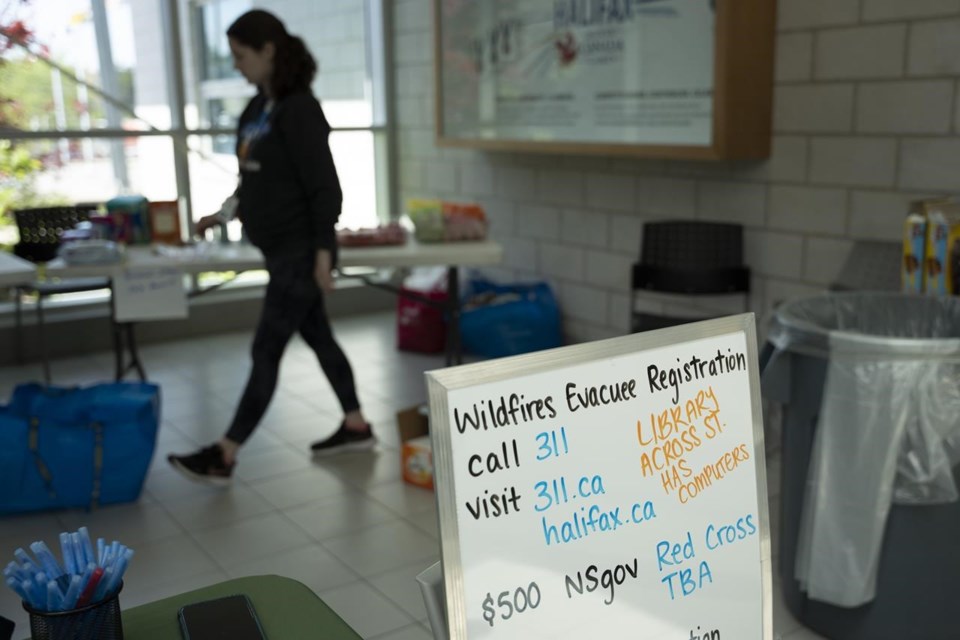HALIFAX — As an unprecedented string of wildfires in Nova Scotia continued to burn out of control Wednesday, thousands of residents forced to flee their homes spent a fourth day wondering what their neighbourhoods will look like when they return home.
Fire officials were hoping for a break in the dry, windy weather, but the forecast did not include any rainfall until Friday night.
As of Wednesday, there were three wildfires burning out of control in Nova Scotia and about 18,000 people forced from their homes by mandatory evacuation orders. In the Halifax area, fire officials said 200 structures, including 151 homes, had been destroyed by a fire that started Sunday in a suburb northwest of downtown.
Joe Benvie, one of 16,000 Halifax-area evacuees, said he was anxious to get home to rescue his two cats.
"It’s horrible, horrible to have to wait," the 45-year-old mechanic said Wednesday as he sat on a curb in a parking lot near a firefighting command post in Upper Tantallon, N.S., a donated cat carrier beside him.
Visibly fatigued, Benvie said he was feeling frustrated by a police decision to stop escorting people to their homes to retrieve pets because of the increased danger caused by deteriorating weather conditions.
"I know it’s windy, but there's living pets in those homes,” he said as a helicopter carrying a large water bucket flew overhead to the tinder-dry woodlands nearby. "To me, my cats are just like my kids. They’re like my family.”
Earlier in the day, the RCMP said requests like Benvie’s should be relayed to the SPCA, which is working with police and firefighters to save as many pets as they can.
Benvie, who has diabetes, said he also needed to get his small mobility scooter and medications, but people in need of medicine and medical devices were being told Wednesday to contact their local pharmacy.
Aside from the Halifax-area wildfire, a much larger fire in southwestern Nova Scotia has forced 2,000 people from their homes in Shelburne County. By Wednesday, it covered almost 200 square kilometres, making it one of the largest wildfires ever recorded in the province.
As well, there was a much smaller fire burning out of control about 30 kilometres away in East Pubnico.
But the wildfire getting virtually all of the attention is the one on Halifax's doorstep. And while municipal officials held talks Tuesday about allowing some evacuees to return home, Halifax deputy fire Chief David Meldrum made it clear that wasn't about to happen.
"We are not changing the evacuation zone at this time,” he told a news briefing Wednesday outside the command post. “I would recommend that everyone anticipate, given the weather forecast, (not) making plans for re-entry.”
Meldrum said the 8.4-square-kilometre fire, which had grown slightly by Tuesday night, could flare up again because of the weather.
"I cannot speculate on when this fire will be under control," Meldrum said. "I would encourage all of us to be ready for a long firefight. We've got a lot of dry-weather days ahead."
Wind gusts from the southwest were expected to reach 25 kilometres per hour Wednesday, and the temperature was forecast to rise to about 25 C inland, with the humidity remaining very low at around 20 per cent.
Meldrum said that under those conditions, the fire could quickly grow and spread, which is why the 100-square-kilometre evacuation zone would remain in place.
"It’s a site of tragedy," Meldrum said when asked about what remains in the zone.
"There's widespread destruction, and there's a level of randomness that comes with wildfires when they hit ... where people live. There are properties that are unharmed close to properties that are destroyed. It’s terrible to see. These are people’s homes.”
Stewart Jordan, a 63-year-old resident of the Highland Park subdivision, did his best Wednesday to put the unfolding disaster into perspective.
“It’s just physical possessions,” he said in an interview, adding that he’s become resigned to not knowing the fate of his home while the fire is still burning.
“Even if you find out for sure that, at this minute, your house is OK, that can change in a blink of an eye," he said. "All it takes is for the wind to change direction a couple of degrees, and what was green becomes black.”
David Steeves, a forest resources technician with Nova Scotia’s Department of Natural Resources, said when the winds blow from the south, as they were on Wednesday, they are considered "drying winds" that will draw moisture from leaves and twigs on the ground. And when humidity levels get close to the forecast temperature, that's a worrying phenomenon firefighters refer to as a "crossover."
“That’s an indicator of extreme fire behaviour,” Steeves said.
Despite the ongoing risk, no deaths or injuries have been reported as a result of the fires.
In Ottawa, Prime Minister Justin Trudeau expressed his “shock and awe and empathy” for those across the country who are having to deal with wildfires, and he made a point of mentioning Atlantic Canada.
"The images that we've seen coming out of Alberta and the Northwest Territories over the past weeks, the stories and the images we're seeing coming out of Nova Scotia and New Brunswick, are heartbreaking," he said Wednesday.
"We know people are extremely distressed by what's going on. As a federal government, we will be there to offer support."
This report by The Canadian Press was first published May 31, 2023.
Michael Tutton and Michael MacDonald, The Canadian Press



